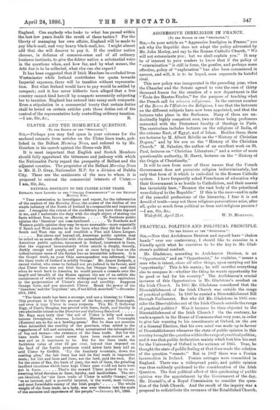AGGRESSIVE IRRELIGION IN FRANCE.
[To THE EDITOR OF THE " SPECTATOR.")
Srn,—In your article on " Aggressive Irreligion in France," you ask why the Republic does not adopt the policy advocated by Mr. John Morley, and say to the Roman Catholic Church, " We will not exterminate you ; but we shall explain you." It may be of interest to your readers to know that if the policy of " extermination " is still in force, the gentler, and perhaps more effective, policy of " explanation " has also been commenced in earnest, and will, it is to be hoped, soon supersede its hateful rival.
This new policy was inaugurated in the preceding year, when the Chamber and the Senate agreed to vote the sum of thirty thousand francs for, the creation of a new department in the " Ecole des Hautes-Etudes," for the purpose of teaching what the French call les sciences religienses. In the current number of the Revue de l'Histoire des _Religions, I see that the lecturers on the different subjects have now been appointed, and that the lectures take place in the Sorbonne. Many of them are un- doubtedly highly competent men, two or three being professors connected with the Protestant faculty of theology in Paris. The curriculum includes lectures on the religions of India, of the extreme East, of Egypt, and of Islam. Besides these, there are lectures by M. Albert Wyllie on the "History of Christian Dogma," and by his son on the " History of the Christian Church." M. Sabatier, the author of an excellent work on St. Paul, lectures on " Christian Literature ;" and a writer of more questionable authority, M. Havet, lectures on the " History of the Origin of Christianity."
It will be seen from some of these names that the French Government does not persecute religion indiscriminately, but only that form of it which is embodied in the Roman Catholic system. I have frequently asked Frenchmen of education why their Government is so hostile to Catholicism, and their answer has invariably been, "Because the vast body of the priesthood were disloyal to the Republic." If this is the case—and in spite of the peaceful professions of the hierarchy, I fear it is not devoid of truth—may not these religious persecutions arise, after all, quite as much from political as from anti-religious passion ? —I am, Sir, &c.,


































 Previous page
Previous page